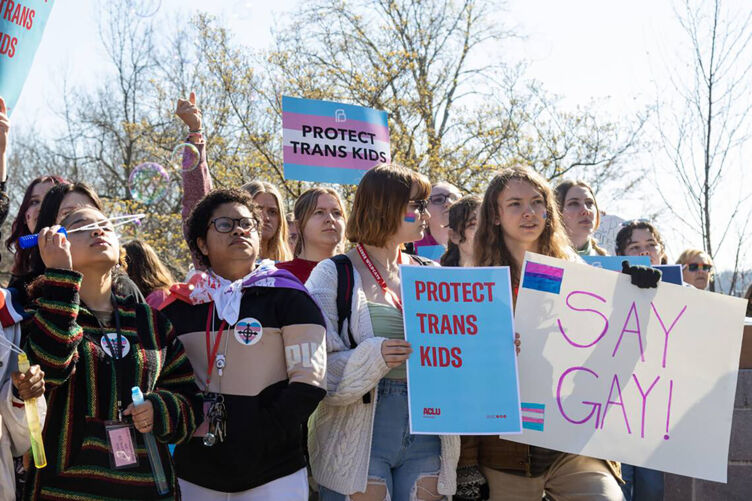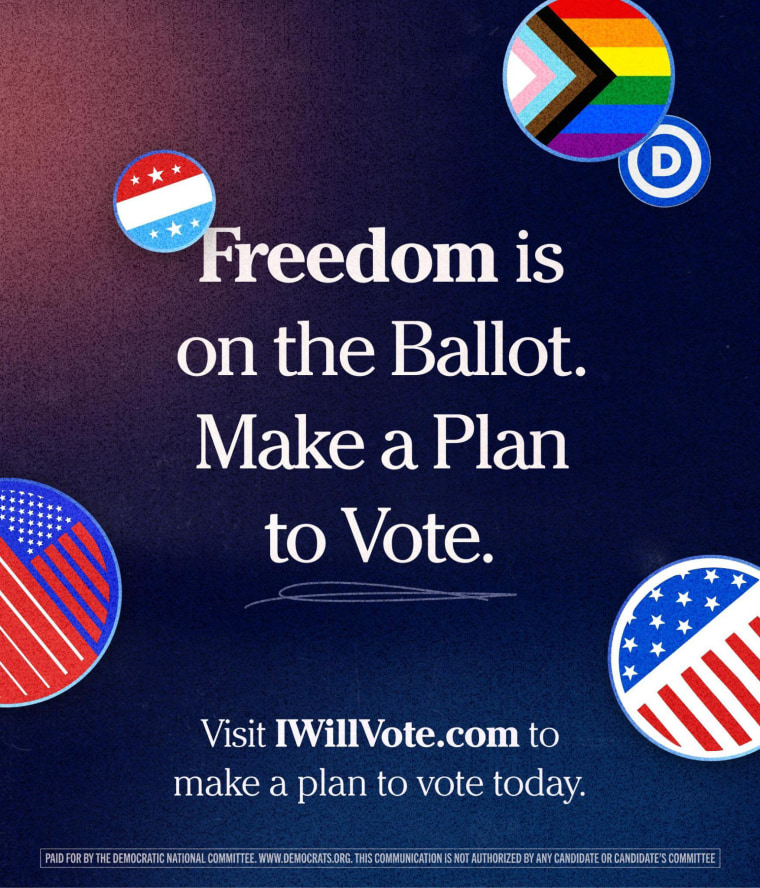Former President Donald Trump’s campaign released a new ad centered around the claim that Vice President Kamala Harris “supports taxpayer-funded sex changes for prisoners and illegal aliens.” The ad highlights this claim while showing pictures of her with a trans person, a nonbinary person, and a drag queen.
“Kamala is for they/them,” the 30-second ad says. “President Trump is for you.”
LGBTQ Nation evaluated the ad to see whether it holds up to scrutiny.
Kamala’s History
While not explicitly stated within the ad, the core of the claim refers to a 2019 questionnaire sent out from the American Civil Liberties Union (ACLU) asking for Harris’s stance on key policy issues when she was running as a presidential candidate independent from then-candidate Joe Biden.
The questionnaire asked: “As President will you use your executive authority to ensure that transgender and non-binary people who rely on the state for medical care — including those in prison and immigration detention — will have access to comprehensive treatment associated with gender transition, including all necessary surgical care? If yes, how will you do so?”
Harris said yes and replied: “It is important that transgender individuals who rely on the state for care receive the treatment they need, which includes access to treatment associated with gender transition. That’s why, as Attorney General, I pushed the California Department of Corrections and Rehabilitation to provide gender transition surgery to state inmates. I support policies ensuring that federal prisoners and detainees are able to obtain medically necessary care for gender transition, including surgical care, while incarcerated or detained. Transition treatment is a medical necessity, and I will direct all federal agencies responsible for providing essential medical care to deliver transition treatment.”
Is This Extreme? No, Actually.
The Trump ad frames Harris’ position as if it’s a very unusual and extreme stance. However, her stance is actually required by the Constitution. The Eighth Amendment of the Constitution restricts “cruel and unusual punishment” from being applied to prisoners or detainees in any context — this extends to healthcare as well. Because of this amendment, it’s unlawful to deny essential healthcare to anyone detained by the U.S. government.
Gender-affirming care is medically necessary according to leading medical associations like the American Medical Association and also the U.S. government. The U.S. Department of Health and Human Services’ Offices for Civil Rights details how denial of coverage for gender-affirming care violates the Americans with Disabilities Act. Earlier this year, federal courts ruled that such care is medically necessary and needs to be included in state-funded health insurance plans.
Gender-affirming care includes hormone replacement therapy, fertility preservation treatments, and gender-affirming surgeries, which may include surgeries to change one’s chest and genitalia.
As such, failure to provide inmates and detainees gender-affirming care — including “sex-change surgeries” is unlawful and unconstitutional.
What Is Kamala’s Current Stance?
In a statement provided to CNN in September, Harris stated that her opinions on such policies are “shaped by three years of effective governance as part of the Biden-Harris Administration,” and that “as President, she will take that same pragmatic approach, focusing on common-sense solutions for the sake of progress.” CNN did not elaborate on whether Harris currently supports these claims.
Harris has made no public comment about her stances on these issues since. Michael Tyler, communications director for the Harris campaign told Fox News that the information within the questionnaire is not a part of her platform or proposals. Tyler didn’t offer new details on where she currently stands on the issue.
Are These Procedures Common?
Gender-affirming procedures, particularly surgeries, are not commonly conducted on federal inmates or detainees. According to a statement from the U.S. Bureau of Prisons to FactCheck.org, only two federal prisoners — out of over 2,000 transgender federal prisoners — have received any form of gender-affirming surgery.
The Bureau of Prisons has a public document describing their procedures for trans prisoners. It says, “For transgender inmates in Bureau custody, surgery may be the final stage in the transition process and is generally considered only after one year of clear conduct and compliance with mental health, medical, and programming services at the gender-affirming facility. Once that period elapses, an inmate may submit a request to his or her Warden requesting surgical consideration”
As for undocumented immigrants detained by Immigration Control and Enforcement (ICE), there is no public record of any surgeries being conducted. Such a surgery would be difficult to conduct – immigrants are held by Customs and Border Patrol for less than a week on average, while those held with ICE are detained for, on average, 47 days. Pre-operative preparations and post-surgical recovery time may require more time.
ICE said to FactCheck.com of their policies for trans inmates, “The agency recognizes that detained transgender noncitizens have unique needs while in ICE custody. In response to those needs, we have developed structures within our operation to safeguard their rights and ensure their emergent care needs are met from the moment they arrive and throughout the entirety of their stay.”
While ICE policy does recommend providing gender-affirming care to detainees, such surgeries would be difficult to provide due to the complexities involved. Gender-affirming surgeries involve multiple consultations with a surgeon over the course of a year and often have lengthy waiting lists. The surgeries also have a lengthy recovery period that is highly individualized, with post-surgical care requiring many months to upkeep. This is especially unlikely to occur in ICE custody. As of October 2024, there were fewer than 300 trans immigrants in custody.
There is, however, evidence of immigrants being deprived of such medically necessary care. Not only does ICE have a reputation of allegedly providing almost torturous conditions to detainees that often involve solitary confinement and deprivation of medical care, but trans immigrants have reported medical neglect in ICE facilities with the denial of hormone replacement therapy. One transgender woman even had a breast implant burst, which led to inadequate after-care and endless delays.
Expert Opinions and Verdict
LGBTQ Nation reached out to the Harris and Trump campaigns for comment on this issue, however neither responded before publication.
Amy Whelan, Senior Staff Attorney with the National Center for Lesbian Rights, said, “People in prisons and immigration facilities have protections under both the U.S. Constitution and federal law when they experience serious medical conditions.”
“Because those people have no ability to seek care on their own, they must be provided with medical care that sufficiently treats those serious conditions,” Whelan added. “As the medical community has understood for decades, surgery is medically necessary for some people who are experiencing serious gender dysphoria, just as insulin may be medically necessary for diabetics or removing a tumor may be medically necessary for someone diagnosed with cancer. These are foundational principles that apply to all people.”
Based on the above evidence, LGBTQ Nation rates this claim as having a mixture of truth and falsehoods within it.
While Harris has previously stated that she supports providing gender-affirming care to trans inmates and detainees, she has not provided up-to-date comment on the matter. There is scarce evidence that these procedures even occur with any notable frequency, and if anything there is an intense medical neglect of trans people being detained from care.

